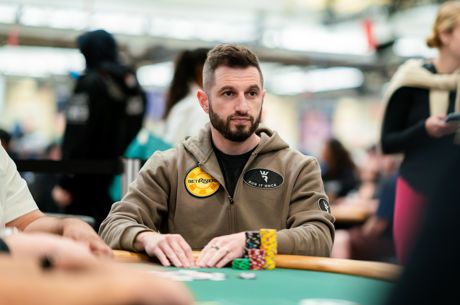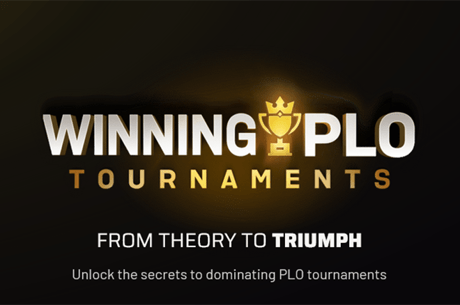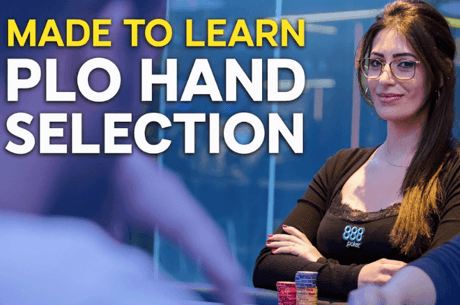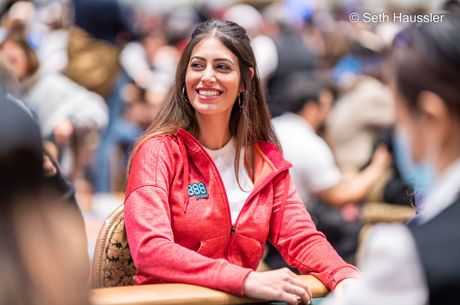PLO Hand Analysis with Brian Rast Versus Tom Dwan

Brian Rast, also known as “tsarrast” online, is a regular in the online nosebleeds and frequently displays his crafted skill in both no-limit hold’em and pot-limit Omaha on the $500-$1,000 HA tables on Full Tilt Poker. He sat down with PokerNews to discuss a pot-limit Omaha hand he played against Tom Dwan.
Lineup and Stack Sizes
Tom Dwan — $130,000 — Under the Gun
Brian Rast — $92,000 — Small Blind $500
Hac Dang — $154,000 — Big Blind $1,000
Gus Hansen — $96,000 — Button
Preflop Action: Dwan raises to $3,000 with A♥9♥8♠7♦. Hansen calls on the button. Rast calls from the small blind with A♦K♦10♣6♠. Dang folds. The pot is now $10,000.
What were your thoughts on this hand preflop?
Well, preflop, my hand is good enough to play. I have a suited ace and little bit of connectivity with ace-king-10. The six is a little bit of a dangler, but there’s one straight I can make with it. Basically I’m thinking my hand is good enough to play and see a flop with, and I’m getting three-to-one on my money. I’d rather call than fold. The problem with three-betting is that we are pretty deep. If I three-bet preflop, I can make it $10,000 and they will both probably call because we are deep. Then there will be $30,000 in the middle, and I’ll have $80,000 behind which makes my stack-to-pot ratio almost three-to-one out of position with a hand that’s not really much of an equity favorite against anything that they’re going to have. Plus, if one of them has aces or kings, they’re going to four-bet me, and I’ll have to fold with this hand. So, I think calling is easily the best play with these stacks and against these players. Whether it’s better to three-bet or fold, I don’t know. That could be debated, but I think calling is actually pretty standard in this spot.
Flop Action: The flop comes 8♣6♦2♦. Rast checks, Dwan checks, and Hansen checks. The pot is still $10,000.
What’s your plan with this flop?
The flop is good for me. I have the nut-flush draw with middle pair and three over cards to make a big two pair. My plan is to check-raise the flop here.
Looking back at the hand and knowing what Dwan had, why do you think he didn’t continuation bet?
He has top pair and an open-ended straight draw. I actually like Dwan’s play here. I think he’s afraid that if he bets and gets raised, he can't really fold because he has a lot of equity, but he’s going to be in bad shape against anything that would raise him. He’s going to get raised by a set, by eights up, by pair and a flush draw, flush draws with straight draws, all those hands have him less than 50 percent. So, with only $10,000 in the pot, he doesn’t want to get in another $90,000 with his. He can call a check-raise and get it in on the turn, but it’s still kind of ugly for him. I think what he wants to do is check, see if Hansen bets, and if he does, he can see what I do. If I raise, I think Dwan is probably going to fold his hand, although I’m not sure. If Hansen bets, and I fold, he could call or he might even check-raise. I like his play here. This is probably the top of Dwan’s range for hands that he’s going to check here. Usually he’s going to have weaker hands.
Turn Action: The turn is the 6♥. The board now reads 8♣2♦6♦6♥. Rast checks. Dwan bets $8,300 and Hansen calls. Rast raises to $43,200. Dwan calls and Hansen folds. The pot is now $104,700.
So I make three sixes and still have my nut-flush draw. Now, I’m thinking that I basically always have the best hand here because as I said, Dwan’s hand is pretty much at the top of his range that he’s going to check. If he had a set, or eight-six, he would have bet. Unless he’s trying to play a hand really tricky, like intentionally checking a hand he would normally bet, the only hand he might do that with is six-two, so he’s only going to have that a small percentage of the time. Even if he does have six-two, I’ve got nine outs to improve.
Why did you decide to try and go for the check-raise again?
I felt that the way this got played, there was a good chance one of them would bet the turn. Like if one of them checked the flop with an over-pair or with some sort of draw, or even with a six, I have all those hands beat, and all those hands are beating, so I decide to go for a check-raise. Also, like I said before, I think I’m ahead at this point and I want to get more money in the pot. I don’t think there’s any real reason to call as opposed to raise.
How did Dwan’s call change his hand range in your perspective?
I only have a little less than $46,000 left, so when Dwan calls, I’m pretty sure I put him on a six, usually. He might be floating thinking I’m bluffing some of the time. Obviously he doesn’t think I have a full house because he calls me with top pair and an open-ended straight draw, so what I think Dwan is thinking here is that sometimes I’m bluffing, and that on some rivers like a flush card, he might be able to bluff. He also might think that if he hits his straight he’s good. The ten actually wouldn’t have been good because it gives me a full house, but the five would have. I think he’s calling in part to bluff and in part because he thinks his hand has a decent amount of equity. As it turns out, it only has about ten-percent equity, so he was behind.
River Action: The river is the 2♥. The board now reads 8♣2♦6♦6♥2♥. Rast checks and Dwan goes all in. Rast calls and shows A♦K♦10♣6♠ for trip sixes with an ace kicker. Dwan shows A♥9♥8♠7♦ for two pair of eights and sixes. Rast wins the pot of about $190,000.
Why did you decide to check?
Well, at that point, I’m thinking Dwan has one of two hands. The deuce doesn’t help him because if he had a full house, he still has one. I’m thinking he was either floating my check-raise with a weakish hand in order to bluff, or he has a six. If he has a weakish hand, he’s going to bluff with it because that’s why he called, and if he has a six, if I check here, I think there’s a good chance he value-bet it.
Checking is better than betting because, let’s say I bet. If I bet, there’s a pretty good chance that the way I played this hand, that Tom’s going to think I have a pretty strong hand. He might make a hero call with his eight, but he probably isn’t. He’s probably going to call me if he has three sixes, but he could even make a hero fold with a hand like ten-nine-six-five because he’s really only beating a bluff. I’m not shipping the river with a six and a worse kicker than a ten. If I ship the river, I’m repping either a six with a good kicker, or a full house. So, there aren’t a ton of hands I can get him to call me with if I shove, but on the other hand, if I check, I give him a chance to a) value-bet a weaker hand that he might also call me with or b) bluff. Against any tough, tricky, aggressive player, it’s really important to understand the times when you should check to them as a way to trap.
Learn something new? Want to test it out on the tables? Sign up for an online poker account and get in on the action.









